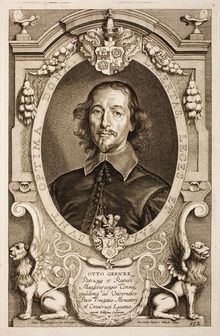
Back أوتو فون غيريكه Arabic اوتوفون جوريك ARZ اتو وان قریکه AZB Ота фон Герыке Byelorussian Ота фон Герыке BE-X-OLD Ото фон Герике Bulgarian Otto von Guericke Catalan Otto von Guericke Czech Otto von Guericke Danish Otto von Guericke German
Otto von Guericke | |
|---|---|
 Otto von Guericke, engraving after a portrait by Anselm van Hulle (1601–1674) | |
| Born | Otto Gericke 30 November 1602 |
| Died | 21 May 1686 (aged 83) |
| Nationality | German |
| Known for | |
| Scientific career | |
| Fields | Physicist, politician |
Otto von Guericke (UK: /ˈɡɛərɪkə/ GAIR-ik-ə,[1] US: /ˈɡ(w)ɛərɪkə, -ki/ G(W)AIR-ik-ə, -ee,[2] German: [ˈɔtoː fɔn ˈɡeːʁɪkə] ⓘ; spelled Gericke until 1666;[3] 30 November [O.S. 20 November] 1602 – 21 May [O.S. 11 May] 1686) was a German scientist, inventor, mathematician and physicist. His pioneering scientific work, the development of experimental methods and repeatable demonstrations on the physics of the vacuum, atmospheric pressure, electrostatic repulsion, his advocacy for the reality of "action at a distance" and of "absolute space" were noteworthy contributions for the advancement of the Scientific Revolution.[4]
Von Guericke was a very pious man in the Dionysian tradition[clarification needed] and attributed the vacuum of space to the creations and designs of an infinite divinity. Von Guericke described this duality "as something that 'contains all things' and is 'more precious than gold, without beginning and end, more joyous than the perception of bountiful light' and 'comparable to the heavens'."[5]
- ^ "Guericke, Otto von". Lexico UK English Dictionary. Oxford University Press.[dead link]
- ^ "Guericke". Random House Webster's Unabridged Dictionary.
- ^ Dewey, Joseph (2009). "Otto von Guericke". In Benson, A.K. (ed.). Great Lives from History: Inventors & Inventions. Vol. 2. Salem Press. pp. 480–482. ISBN 9781587655241.
- ^ Fritz Krafft (17 April 2013). Otto Von Guerickes Neue (Sogenannte) Magdeburger Versuche über den Leeren Raum. Springer-Verlag. ISBN 978-3-662-00949-9.
- ^ Edward Grant (29 May 1981). Much Ado about Nothing: Theories of Space and Vacuum from the Middle Ages to the Scientific Revolution. Cambridge University Press. pp. 18–. ISBN 978-0-521-22983-8.